Introducing cohort five of Unite:ED's Community Partner Fellows program
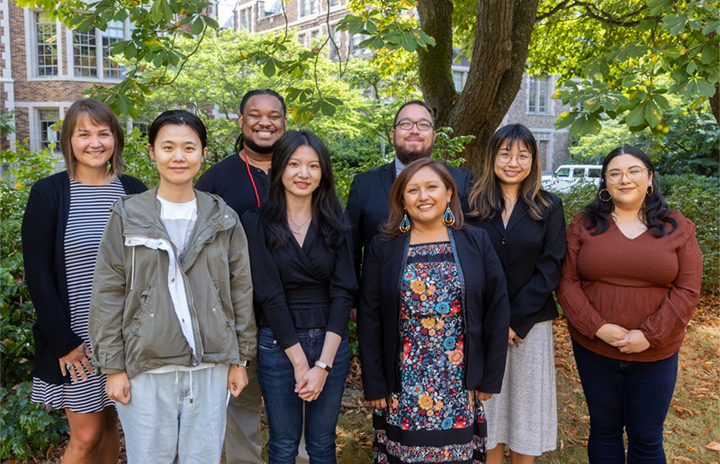
For the 2022-23 academic year, eight doctoral students at the UW College of Education were selected as members of the fifth cohort of Unite:Ed's Community Partner Fellows program. The program supports the development of the next generation of education researchers and scholars while at the same time supporting the work of community-based organizations dedicated to closing opportunity gaps in education. Members of the fifth cohort are Apolonio Pablo Hernandez, Ari Hock, Susan Hou, James King, Yale Quan, Palmy Chomchat Silarat, Kiana Smith and Chengmiao Xu.
"The Community Partner Fellows program uses an effective model for doing community-based work with real impact," Unite:Ed Director Dana Arviso shares. "The program provides outstanding opportunities for doctoral students to apply what they learn in the classroom to addressing educational inequities in the field, and simultaneously bolsters the capacity of nonprofit organizations in our community. This is truly a winning partnership for everyone involved."
Read more about each of the fellows below.
Apolonio Pablo Hernandez
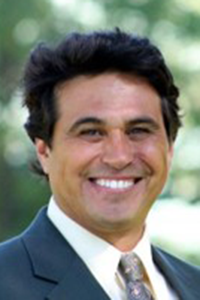
Program: Teaching, Learning and Instruction
Advisor: Dr. Filiberto Barajas
Research interests: Indigenous Education
Community organization: Treehouse
How does your work as a Community Partner Fellow contribute to your professional and/or personal journey?
The Community Partner Fellows program has contributed to my professional and personal journey in a number of different ways. In an attempt to keep this brief, but wanting to give an example of both, let me start with my personal story. I want to begin by saying the Western model failed me, but that is not the focus for my response. I’d like to share a familial story within the community context. As I’m continually reflecting on how I come into all spaces in which knowledge is being honored, I recognize I am a guest on these lands. Wanting to come in as a good relative with all of the relations I come in contact with. Being taught from an Indigenous paradigm has been the greatest gift that I’ve been honored with receiving in this lifetime. It has taught me to reconnect to knowledges I’ve felt innately connected to. Learning from ancestors, elders and traditional knowledge holders has also taught me how to reimagine my Indigenous identity as a form of resistance while in diaspora. Professionally, the program has taught me to fine tune my transdisciplinary optic in intentional ways. Focusing on equity, justice and inclusion in accessible ways, with the hopes of breaking down barriers. I have more recently been policy focused on diversity, equity and inclusion across recruiting, hiring and on-boarding policy practices.
Ari Hock
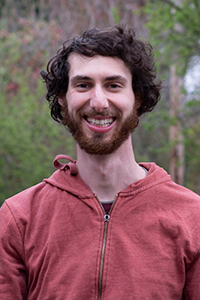
Program: Learning Sciences and Human Development
Advisor: Dr. Katie Headrick Taylor
Research interests: Participatory design research, learning across settings and filmic inquiry
Community organization: Center for Evaluation Research for STEM Equity (CERSE)
What have you learned so far through your work with the community organization you've been paired with?
At CERSE, I have had the opportunity to support both k-12 science educators and professional scientists who are committed to infusing diversity, equity and inclusion in every aspect of their work. And if I had to summarize what I’ve learned in two words: It’s complicated! Schools and the professional societies of scientists are both deeply embedded in inequitable systems, and transforming that takes effort and ingenuity. Every day I am inspired by the people who are going against the grain to create more just learning ecologies — in schools and beyond.
Susan Hou
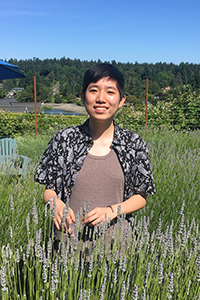
Program: Learning Sciences and Human Development
Advisor: Dr. Niral Shah
Research interests: Learning in social movements and organizing, racialization in the U.S. and Taiwan, affect/emotion and land justice movements in Taiwan
Community organization: Washington STEM
How does your work as a Community Partner Fellow contribute to your professional and/or personal journey?
I started learning and working as a Fellow with Washington STEM in autumn 2021. While I'm still new to the organization and familiarizing myself with the many important projects here, I've focused on qualitatively analyzing data related to race to advocate for racial justice in childcare and K-12, particularly for Black and Indigenous communities in the Greater Seattle area. So far, I've learned about how humility and flexibility in nonprofit organizations are possible, especially since Washington STEM works alongside communities and collaborates on more than just STEM issues. While Washington STEM has centered justice as a core value, their work has been dynamic and they have adapted to community needs as well as the many realities of racial justice work. This particular quality reminds me of my own research work on how people learn anti-racism and decolonization. This learning journey is ever-changing, adapting and continuing. We never comfortably arrive at an “anti-racist” destination but we continue on with our communities in mind. With that, I'm excited to continue my journey with Washington STEM and continue learning about the connections between research and impact.
James King
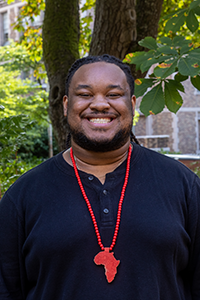
Program: Mathematics Education; Teaching, Learning and Curriculum
Advisor: Drs. Elham Kazemi and Niral Shah
Research interests: Black learners in mathematics classrooms
Community organization: James will be matched with a community organization in 2023.
What is your vision for the kind of impact you'd like to make through your research and/or work in the community?
I want my research to change how Black learners are treated in mathematics classrooms. I want them to look at math classrooms as a place to harbor and spread joy. I am currently a research assistant on a project where we are investigating how leadership can integrate antiracist practices into schools' core teaching and learning work that allows for racially just, ambitious mathematical spaces. What I enjoy most about teaching is helping students grasp their mathematical identities, whether that comes in the way of confidence built over time through numerous problem-solving situations or their own understanding of mathematics deepening. Teaching is fulfilling to me when I help students believe that they are mathematicians.
Yale Quan
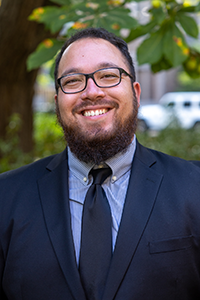
Program: Measurement and Statistics
Advisor: Dr. Chun Wang
Research interests: Development and implementation of psychometric models including longitudinal Item Response Theory and the use of machine learning algorithms in psychometrics
Community organization: Equal Opportunity Schools
What inspires or motivates you when it comes to your research and/or work in the field?
I love being a researcher because I enjoy learning and truly believe that my research can make a difference in how psychometrics is used in driving education policy through data informed decisions. One of my guiding research motivations is this question: Are we measuring what we think we are measuring and is there a better way to do it? I want to ensure that the instruments we use to collect education data are accurately measuring the traits we want to study, and that the psychometric and statistical methods we are using to analyze this data produce reliable results. I am also driven by a desire to develop new methodologies to answer questions about equity in educational measurement.
Palmy Chomchat Silarat
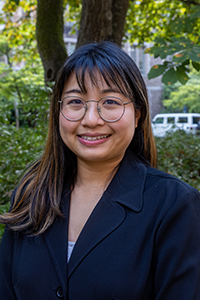
Program: Learning Sciences and Human Development
Advisor: Dr. David Knight
Research interests: Diverse learning styles and abilities, instrument invention for capturing diverse learning abilities
Community organization: Washington STEM
How does your work as a Community Partner Fellow contribute to your professional and/or personal journey?
As a fellow, I get hands-on opportunities to develop tools and contribute to on-going community-based projects that impact students' lives throughout Washington. My professional and personal aim is to make community-based impacts through data gathering, analysis and reports. Therefore, what I am currently doing is exactly what I dreamed of doing.
What is your vision for the kind of impact you'd like to make through your research and/or work in the community?
I would like to develop a standardized tool (measurement, survey, dashboards) that can help streamline the process of assisting students of diverse learning abilities and goals to obtain credentials for employment. My vision was not too vivid prior to becoming a CPF fellow but being exposed to these opportunities, my vision became clearer.
What have you learned so far through your work with the community organization you've been paired with?
I learned to connect the philosophical theory and knowledge content to actionable plans and execution. I am so incredibly thankful for the opportunities to not only understand the issues and barriers in education but also utilize my technical skills to combat them. My thought process is more efficient after learning from Washington STEM staff and leadership.
What inspires or motivates you when it comes to your research and/or work in the field?
People who take action to solve problems motivate me.
Kiana Smith
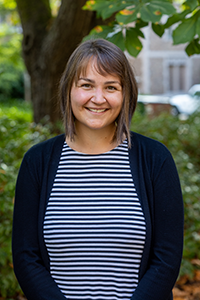
Program: Culturally Sustaining Education
Advisor: Drs. Shaneé Washington and Ann Ishimaru
Research interests: Indigenous ways of knowing, decolonizing education and supporting Indigenous student pathways
Community organization: Kiana will be matched with a community organization in 2023.
What is your vision for the kind of impact you'd like to make through your research and/or work in the community?
As an Iñupiaq scholar, I am specifically interested in working with, in and/or among Tribal Nations. I envision myself working to support communities and schools that serve Native students to improve the educational experience of our Indigenous youth. I am committed to ensuring that equitable learning experiences and opportunities are in place for students and communities. I am also interested in the involvement of projects that cultivate healing and decolonization in education.
What inspires or motivates you when it comes to your research and/or work in the field?
As an Indigenous educator and prior public school student in what we know as Washington, I feel especially inspired to serve students and communities like my own. Growing up apart from my community, in Alaska and in an urban setting, was both challenging and uplifting. I find inspiration in the idea of making a difference for all the little Kianas — the Native kids who deserve to be seen and to feel represented and loved.
Chengmiao Xu
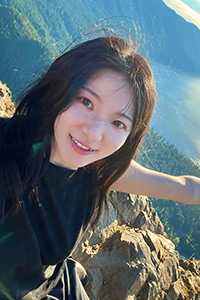
Program: Learning Sciences and Human Development
Advisor: Dr. Soojin Park
Research interests: Language practices and cultivation of home literacy and language environments promoting children's bilingual and biliteracy development in immigrant families
Community organization: Boys & Girls Clubs of King County (BGCKC)
What is your vision for the kind of impact you'd like to make through your research and/or work in the community?
I hope to contribute to BGCKC’s projects by applying my knowledge of youth development and (both qualitative & quantitative) methodological skills I’ve gained through my coursework and work in multiple research projects over years. First, I want to assist with collecting and analyzing youth feedback to understand their experiences in the programs, and ultimately, create recommendations for the program quality improvement based on youth voice. Second, I want to develop surveys for youth and staff in regard to the summer social-emotional learning curriculum to understand the program’s effectiveness.
What inspires or motivates you when it comes to your research and/or work in the field?
Some of the most profound lessons about child development came from conversations I had with low-income and immigrant children attending a public school in Philadelphia. As both a mentor and a researcher in Dr. Michael Nakkula’s Possibility Project, I worked closely with two girls and learned of their experiences as Chinese immigrant students who faced a myriad of problems – such as separation from their undocumented parents, low parental involvement, and lingual barriers in the K-12 setting. These issues extended to their academic performance, social-emotional development, and well-being. From this experience, I felt an enormous responsibility to reduce educational disparities and help disadvantaged children grow and thrive. My concerns about educational equity and optimal child development inspire me to devote my career to research.